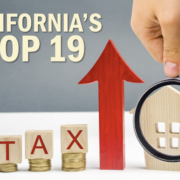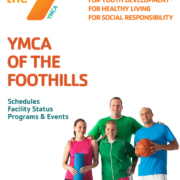CARES Act – Reacting to COVID-19 and Stimulus Payments
in Blog, Monthly Market Insights/by [email protected]We don’t need to recite the obvious. You all know by now that COVID-19 has impacted our lives in many ways. Whatever disruption it has caused in your daily lives, we certainly hope you and your loved ones are healthy.
This letter is long but has vital information about the new legislation recently passed, IRS relief and property taxes.
I. What We Know – CARES Act is now Law
After a lot of talk, Congress did something. The Coronavirus Aid, Relief, and Economic Security Act, (CARES Act), a $2 trillion stimulus package to mitigate the impact of the Coronavirus pandemic was signed into law on Friday March 27, 2020. CARES has relief for individuals and businesses. Below is a brief digest of provisions affecting businesses and individuals.
Individuals
The CARES Act includes stimulus payments of $1,200 for each individual and $500 for each dependent child, defined by the child tax credit rules as under age 17. Below is a brief digest of its provisions.
Who and How Much?
-
Individuals with adjusted gross income (AGI) up to $75,000 a year are eligible for the full $1,200 payment. The payment is reduced by $5 for every $100 in income above $75,000. The payment amount is entirely phased out at an AGI of $99,000.
-
Married filing joint couples with AGIs up to $150,000 a year are eligible for a $2,400 payment. The payment is reduced by $5 for every $100 in income above $150,000. The payment amount is entirely phased out at an AGI of $198,000 (if the taxpayers have no dependent children). Married couples also will receive an additional $500 for every dependent child under 17.
-
Example: MFJ with no children. Keith and Norma are married filing joint. They have no dependent children. If they have AGI of $150,000 or less, they are eligible for a $2,400 payment. If they have AGI above $150,000, their rebate will be reduced and finally phased out at an AGI of $198,000.
-
Example: MFJ with two children. Chris and Pat are married filing joint. They have two dependent children under age 17. If they have AGI of $150,000 or less, they are eligible for a $3,400 payment. If they have AGI above $150,000, their rebate will be reduced and finally phased out if their income hits the top of the threshold amount.
-
Head of household filers with AGIs up $112,500 a year are eligible for the full $1,200 payment and an additional payment of $500 for each dependent child under age 17. The payment is reduced by $5 for every $100 in income above $112,500. Head of household taxpayers will also receive an additional $500 per dependent child under age 17. With no eligible children, a head of household filer is phased out at AGI of $137,000. With one eligible dependent child, a head of household filer is entirely phased out of the rebate payment at AGI of $146,400.
-
Example: Head of Household – no children under 17. Heather has an 18-year-old high school senior living with her and qualifies as a head of household filer. If her AGI is $100,000, Heather’s payment is $1,200. Her dependent child does not qualify her for the additional $500 payment because the child is not under age 17. If Heather’s dependent child is under age 17, her payment is $1,700.
-
Phase-out of the rebate. If your income is above the threshold amounts, a reduced payment will result. The reduced amount using your own income (AGI) can easily be calculated using the Washington Post calculator.
What needs to be done to get the Stimulus Rebate?
Nothing.
The IRS will deposit the calculated amount directly into your bank account, using the AGI and the bank information on your 2019 tax return. If your 2019 return hasn’t been filed, the IRS will use the AGI and the bank information from your 2018 tax return. If there’s no bank information on the return, the IRS will mail a check.
When Will the Payments Arrive?
The IRS says that a direct deposit should be in your bank account in about three weeks. Checks should start arriving in six to eight weeks.
2020 Required Minimum Distributions
Required Minimum Distributions (RMDs) are waived for 2020 and individuals that have already taken their RMDs for 2020 can return those if they so desire. This is specific to defined contribution plans and IRA accounts (including Inherited IRAs) but not defined benefit plans at the moment. The provision includes RMDs for individuals who turned 70½ during 2019 and had not taken their distribution prior to January 1, 2020. Beginning January 1, 2020, the new age at which one must start taking RMDs is 72.
2020 Tax Return
Technically the stimulus rebate is a 2020 refundable tax credit. The payment received in the next few weeks is an IRS advance. If you have less income in 2020 than in 2019 because of layoffs, reduced hours and closed businesses, and your rebate payment was reduced by the income threshold, you’ll receive a credit for the difference on your 2020 return. If for some reason, you receive too much of an advanced payment, you do not have to pay back the excess.
Businesses
The U.S. Chamber of Commerce is an invaluable resource for business owners. They have pulled together a significant amount of information that summarizes your eligibility and options under the CARES Act. We recommend visiting their website for more information.
Our accounting firm partner, The Accountancy, has also compiled a wealth of information for businesses. Here are some links to various topics:
Forgivable SBA Loan Program
Business Tax Relief
Employee Retention Credits
Payroll Tax Deferral
Net Operating Losses
Business Interest Deductions
Suspension of Non-Corporate Loss Limitation
Alternative Minimum Tax (“AMT”) Credits
Individual Relief and Assistance
Unemployment Compensation Benefits
Student Loans
Credit Reporting
Federally Backed Mortgages
Retirement and Other Employee Benefit Plans Relief
II. IRS People First Initiative
The IRS has provided significant relief in the form of filing extensions (covered in our last communication), dispute resolution and deferring payment on installment loans. If you owed money to the IRS and entered into a payment arrangement, you are allowed to not make payments until July 15, 2020. If this applies to you, see a more complete explanation by clicking on this link: IRS Newsroom
If you owe taxes from prior years, now may be a good time to file Offers in Compromise to reduce the amounts owed in your favor.
III. Property Taxes
In case you are wondering about property taxes, county assessors have indicated that there is no reprieve from the payment of your property taxes due on April 10. However, some counties have also stated they will waive penalties if you do pay after that date if you request a waiver. Since not all counties are handling this the same way, we suggest you visit the county’s property tax website for more information.
We want to help our clients understand how this Act impacts them. Any change in tax laws presents planning opportunities that should be considered and discussed. As we learn more about the CARES act in the coming days and weeks, we will continue to update you.
California Prop 19: Does it Help or Hurt You?
in Blog, Monthly Market Insights/by [email protected]California proposition 19 becomes effective on February 16, 2021 and allows homeowners over age 55, disabled or wildfire/natural disaster victims to transfer their primary residence tax base (assessed value for property taxes) to a new residence in California. It also creates a state fire protection services fund to help with the future costs of the large wildfires our state has been experiencing.

To help pay for these changes, proposition 19 changes the taxation of family property transfers. The result is many inheritors will pay significantly higher property taxes or be forced to sell the property.
Before Proposition 19, primary residence transfers between parent and child were excluded from property tax reassessment. The state did not consider this type of transfer a change of ownership and had no dollar limitations or other restrictions. The transfers could also be from child to parent and between grandparent and grandchild if the parents were deceased.
For family property transfers not involving the primary residence, value reassessment only occurred on the amount above $1 million of assessed value or $2 million on community property.
This allowed many families to pass vacation homes, rental properties, and commercial properties valued at $2 million or less to their children without an increase in property taxes.
After Prop 19 (February 16th, 2021), primary residence transfers for the above family groups are not subject to value reassessment if the inheritor uses the property as their primary residence and the fair market value is not greater than $1 million of the assessed value. If it is, value reassessment occurs on the amount over $1 million.
Transfers of all other property types are subject to value reassessment.
This means the family vacation home, rentals, and commercial property are subject to value reassessment. After you pass, the inheritor will receive a “step up” on the property’s value to fair market value. If they sell the property immediately, they will likely be subject to little if any capital gains taxes on the sale. This assumes there is no change in the IRS inherited asset “step up” rules.
If they keep the property, they will have to pay property taxes at the new “assessed value” amount. For Los Angeles County, the rate is 1.25% of assessed value or $12,500 annually per million.
Proposition 19 applies to all family property transfers including property titled under a Revocable Trust, Qualified Personal Residence Trust (QPRT) or Revocable Transfer on Death.
There are options available which can reduce the negative impact of proposition 19. After February 15th, 2021 several of the options below will be less attractive. In addition, new state legislation is required to answer questions created by the Proposition 19 changes which could impact your decision. Each option has advantages and disadvantages and should be thoroughly reviewed with a qualified Trust attorney.
-
Gift or sell the property to your children before you pass.
-
Add your child to your deed as tenants in common or joint tenancy.
-
Gift or sell the property to a Trust (IDGT) Intentionally Defective Grantors Trust with or without a leaseback.
-
Transfer at least 50% interest in the property to a Trust (IDGT) and create an LLC.
-
Consideration of the impact to the new assessed value (step up) must be weighed against the value of maintaining a low property tax amount for your children. In addition, Federal gift tax, estate tax and income tax should be considered.
All information is meant to be educational and correct as of the date of this article. This article is limited to proposition 19 and its impact. Please contact your Trust attorney for your unique circumstances. If you do not have a Trust attorney, please contact us.
This article was adapted from a presentation by Kevin J. Moore, LLM, Kevin J. Moore & Associates, 301 E. Colorado Blvd., Suite 600 Pasadena, CA 91101 (626) 568-9300 [email protected] and a presentation by the San Francisco Assessors Office on January 5, 2021.
YMCA’s Fiesta Days Memorial Run/Walk
in Monthly Market Insights/by [email protected]YMCA’s Fiesta Days Memorial Run/Walk
- Descanso Gardens(map)
This year, Penniall & Associates is proud to be a title sponsor for the YMCA of the Foothills will host the 43rd Annual Fiesta Days Run on Memorial Day, Monday, May 28th, at Descanso Gardens.
The YMCA Fiesta Days Run has grown into a major Memorial Day weekend tradition, as part of LCF Chamber of Commerce Fiesta Days Celebration bringing over 1000 local runners, families and volunteers together for a fun and inspiring morning.
$10 discounts available for teams of four or more, use promo code “TEAM”’
All proceeds from the event benefit the Y’s Health Aging initiative. The Y’s life-saving initiative empowers seniors through balance and strength programs.
Did you know 1 in 3 seniors experience a serious fall? The Y is saving lives with the Balance and Thrive!
This event will feature a beautiful 5K, 10K & 1 Mile Family Run/Walk Registration fees include:
• Race Entry and Goody Bag including the YMCA Fiesta Days Run T-shirt
• Refreshments, Awards and Raffle prizes from local businesses
WHERE AND WHEN IS THIS:
The event will be held on May 28th at the beautiful and scenic Descanso Gardens.
The 1 Mile Family Run/Walk will begin at 7:00 am
The 10K/5K Run will begin at 7:30 am










